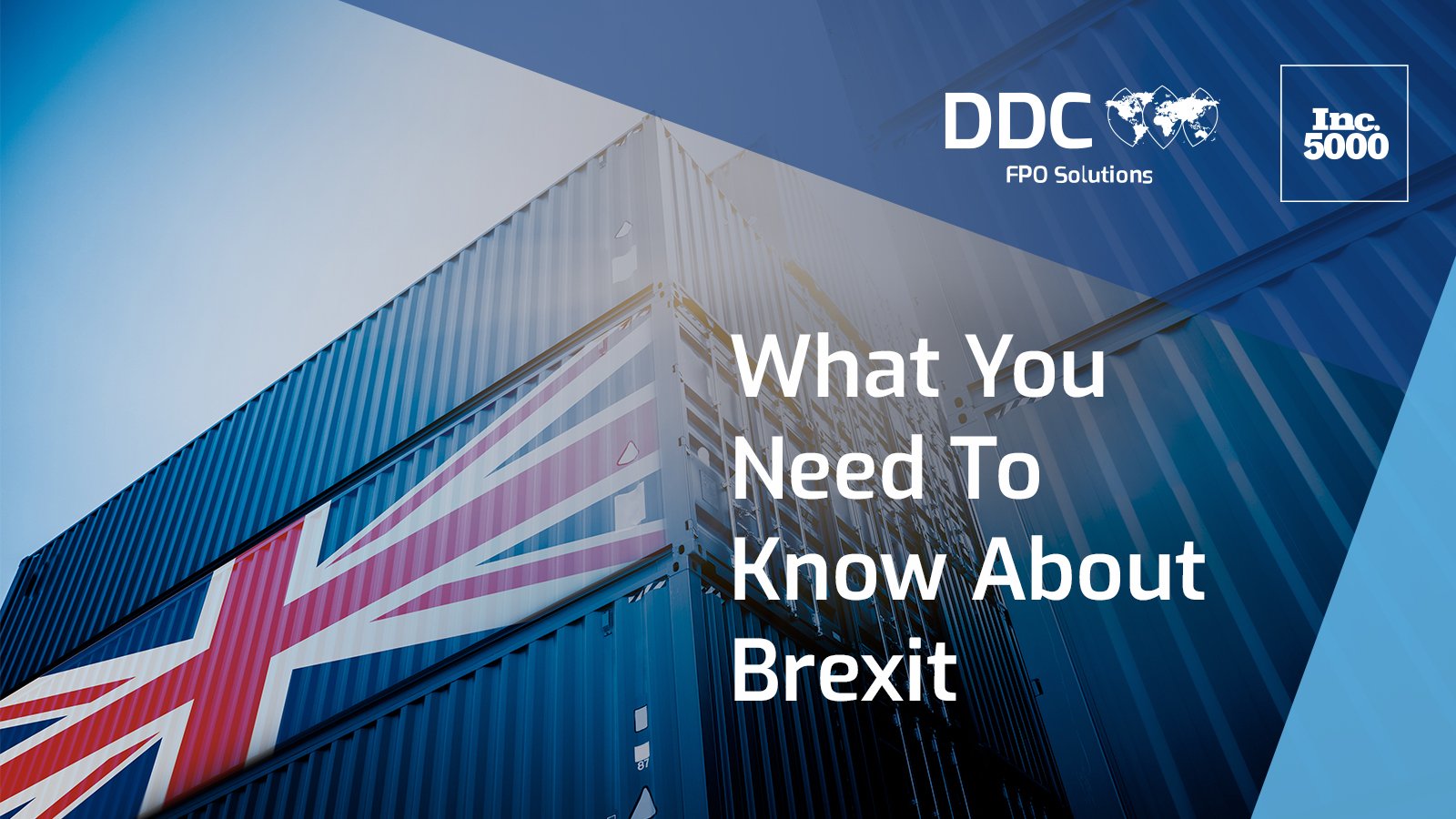What You Need To Know About Brexit

On December 24, the UK and European Union finalized a trade deal that went into effect on January 1, 2021.
The zero-tariff, zero-quota deal is a relatively positive outcome, but new requirements are still expected to cause a remarkable shakeup within the transportation industry as freight flows and as current policies and regulations face extensive adjustments.
What does the withdrawal mean for international shipping and customs brokerage, and how problematic will the new divide become?
What is Brexit?
As of January 1, 2021, the transition period with the EU officially ended, and the UK will now operate an external border as a sovereign nation. The recently released 200-page manual outlines the processes for moving goods between the UK and the EU from 2021 onwards (though for certain aspects of the deal, such as the Northern Ireland Protocol, specifics are still under ongoing negotiation).
The United Kingdom's exit from the European Union is transforming trade with the EU and other strategic partners around the globe. What does this mean for transportation and logistics providers?
Brexit has reshaped the shipping landscape of Europe — altering the continent-wide flow of goods by all modes. American Shipper warns that supply chains perform best in fluid and stable environments, and that overall performance may potentially be impacted significantly by Brexit until things stabilise once again.
| What’s the status of Brexit? After months of tense negotiations, an eleventh-hour agreement was reached on December 24, 2020. The deal establishes that there will be no tariffs or quotas, but many other details are yet to be negotiated, and new paperwork requirements will still pose challenges. See the latest Brexit news. |
Who does Brexit affect?
Brexit will affect all UK organisations that trade goods with the EU and vice versa.
According to McKinsey, the EU accounts for 54% of all goods imported into the UK, making Brexit a concern for companies with British operations — and a compelling reason for industry leaders to revisit their shipping strategies.
Brexit affects three critical freight flows:
- Outbound products of UK origin destined for other EU markets and countries that have an agreement with the EU
- Cargo entering the UK from EU nations and countries that have trade agreements with the EU
- Transit flows originating in markets outside the EU that currently pass through the UK that are destined to other EU markets (and vice versa)
| What is the Northern Ireland protocol? One of the key complications of the Brexit deal was the border between Northern Ireland and the Republic of Ireland. Now that the UK has left the EU, it’s the only remaining land border between the two trade territories. Under the Northern Ireland protocol, Northern Ireland remains in the EU single market for goods, and will therefore follow EU rules and regulations. It’s important to note that the Northern Ireland protocol is not permanent, and the Northern Ireland Assembly will vote periodically on whether to maintain the arrangement. Once grace periods officially end, certain goods will be subject to checks, and some will be prohibited from entering Northern Ireland altogether. Exports from Northern Ireland to Great Britain will remain largely unaffected, with export declarations required only in special circumstances. Article 16 of the NI Protocol allows parts of the agreement to be temporarily held off if they cause "serious economic, societal or environmental difficulties that are liable to persist, or to diversion of trade." The UK government has indicated willingness to invoke the article if necessary. Grace period complications In March 2021, the UK proposed extending the grace period for animal products, which was set to expire on April 1 — meaning that until further notice, Great Britain would continue shipping food products to Northern Ireland without having to adhere to new paperwork requirements. The EU threatened legal action, stating that extending the grace period was a unilateral move by Great Britain that constitutes a breach of the agreement. Though this threat was temporarily put on hold in July 2021, the UK pushed back deadlines even further. The decision was controversial and poorly received by many companies in the food and agriculture industry — in the words of Ian Wright, Chief Executive of the Food and Drink Federation (FDF), the grace period extension “penalises those who followed Government advice and rewards those who ignored it.” As of January 1, 2022, UK importers (or their representatives) are required to pre-notify authorities about agricultural and food imports from the EU. Certain “high-risk” products also require Export Health Certificates (EHCs). Additional requirements for particular products were due to come into effect in the summer and autumn of 2022, but those deadlines were pushed for a fourth time due to economic pressures surrounding the war in Ukraine. Jacob Rees-Mogg, Minister for Brexit Opportunities and Government Efficiency, said in a written statement to the Commons that “no further import controls on EU goods will be introduced” in 2022. This means that all the special infrastructure built up in preparation for the additional border checks will not be needed for the foreseeable future (and possibly won’t be needed at all). A continuing legal battle In June 2022, the UK government introduced a bill to adjust parts of the Northern Ireland Protocol. The proposed changes include:
As a result, the EU has resumed its legal action against the UK, which could result in the UK being fined by the ECJ. In the worst-case scenario, the dispute could trigger a full-blown trade war, though both sides have indicated they are open to further negotiation. |
VAT and international shipping implications
Prior to Brexit, the UK operated under EU VAT, a common system of value-added tax (VAT) rules for EU member states. But as of January 1, 2021, the UK implemented changes to the VAT rules.
Due to these changes, an estimated 145,000 businesses will now be responsible for making import-export declarations for the first time.
Goods coming into the UK from other countries are now considered imports and exports, and import VAT and customs duties apply. As a result, many non-UK companies will need to register for the first time with the UK’s tax authority, HM Revenue and Customs (HMRC).
This is already causing significant disruption, as many EU companies are opting to halt UK deliveries — some temporarily, others indefinitely — rather than register with HMRC.
As of July 1, 2021, new VAT obligations are in place for business-to-consumer (B2C) eCommerce sellers. Those changes include:
- The low-value VAT exemption for imports has been eliminated. Previously, goods with a value up to €22 were exempt from VAT. That is no longer the case. This adjustment could drive up prices on UK-produced goods in the EU and have a cooling effect on retailers of low-cost goods.
- The One-Stop-Shop (OSS) is now live. eCommerce sellers can declare and pay VAT in the EU for goods valued up to €150 online after registering for the OSS platform. Previously, a retailer operating in several EU countries would need to register for VAT payments in each; the launch of OSS will streamline that process to a single IOSS registration for the whole EU.
- Deemed supplier rules have changed. Online marketplaces that facilitate sales now qualify as “deemed suppliers,” making them liable to charge customers VAT and report sales to tax authorities.
These changes affect e-commerce platforms, sellers, and consumers, as well as couriers who deliver e-commerce goods across borders.
Are businesses prepared for change?
Our experts predict that as relationships become more stabilised, new information surrounding trade agreements and tariffs will develop and become readily available, but now is the time to start having those post-Brexit conversations about how to get your shipments across borders.
Despite the new trade deal being in effect, experts say many businesses are tremendously underprepared. Challenges like navigating new IT systems, scaling up for more paperwork, and expanding language capabilities will be key factors in the months ahead.
To make matters worse, the pandemic has produced unexpected setbacks. According to Logistics Manager, COVID-19 has impacted available capital and has derailed Brexit preparations, preventing businesses from investing in new customs processes or stockpiling to protect themselves against disruption to supply chains. An October 2020 survey of UK supply chain managers found 46% were less prepared for Brexit in 2020 than 2019 due to the pandemic.
| Building a bespoke Brexit solution For one of the world’s largest and highest performing global transport and logistics providers, Brexit preparations included recruiting, onboarding, and training 500 new employees to assist with the increase in paperwork and new processes. As an established client of DDC FPO, this company trusted us to create a bespoke solution. With our cost-effective and scalable approach, we achieved the expressed timeline for recruiting, training, and onboarding desired key roles within 20 weeks, helping the client achieve 99% accuracy (exceeding their accuracy goals by 4%). Read the full case study to learn more. |
Post-Brexit considerations
Now that it has left the EU, the UK will no longer be permitted to trade with the EU as a whole; trade with each EU country will require separate customs declarations.
To put in perspective the procedural changes that are coming, the UK’s tax authority has estimated that firms will need to file 400 million extra customs declarations annually. That puts the cost of the new customs paperwork at about £13 billion a year (converted to the US dollar, that’s over $17 billion).
Just as processes have been in place between the UK and non-EU countries, customs procedures will now have to be instituted and complied with at each border within the EU through which a UK export or import passes. The surge in paperwork may necessitate as many as 50,000 new jobs.
Additionally, The Loadstar warns that if transportation and logistics providers do not follow new regulations and the government issued systems, they will face personal fines and penalties. An example of new regulations: truckers will be required to file shipment information electronically and receive approval from the tax authorities prior to traveling towards the UK/EU border.
Language barriers also pose a challenge for businesses who have never handled import-export declarations before, as miscommunications can lead to costly errors and delays. Considering the EU has 24 official languages, multilingual proficiency will be another necessity moving forward.
How can businesses prepare?
The Brexit guidance issued by the UK government is to “get someone to deal with customs for you.” However, officials warn that what third parties can do (and who will be liable) depends on the services they provide and the commercial agreement in place.
If you partner with an outside organisation to assist with Brexit-related changes, be sure to choose one that specialises in international shipping and customs brokerage processing with multilingual proficiency. An experienced business process outsourcing (BPO) partner can provide the support your business needs during this transition period and beyond.
Why work with a customs compliance specialist? Read more.
For more insight and advice regarding international trade post-Brexit, see this resource page put together by the Freight Transport Association.
Partner with DDC for post-Brexit success
With customs brokerage processing services available in more than 30 languages, DDC has the experience, business continuity and resources available to help transportation providers navigate through unanticipated circumstances from the point of origin and through customs — ensuring speed and accuracy while reducing the impact of Brexit on your business.
Contact us to learn more about how we can help with your customs brokerage processing needs.
How Can We Help You?
Get in touch to learn how we can support your success.
Get Started
